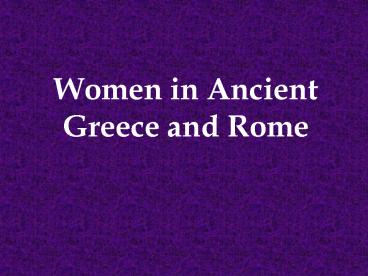Women in Ancient Greece and Rome PowerPoint PPT Presentation
1 / 23
Title: Women in Ancient Greece and Rome
1
Women in Ancient Greece and Rome
2
Real People, Real Lives
Same capacities, same biology, same ways of
perceiving and communicating Cultural
expectations are different Material realities are
different Individual difference always exists
within the generalities we learn Our ways of
valuing experience, based on accomplishment and
freedom, might not be prioritized in other
societies Always remember the fundamental
humanity of ancient women!
3
Who are the women?
Aristocratic women we have the most information
about them Women of the dominant culture their
lives are more visible than other womens, whose
cultures left less information Poor women often
with different necessities from aristocrats, but
far less visible Slaves the vast substratum of
Greek and Roman society, two of the worlds five
ever slave states
Goddesses and heroines, creations of society that
show the potentials and ideas behind womens roles
4
Prehistoric Mediterranean
How did women live in early agricultural
societies? Did women have a central role in
social control? In religion? Was there an early
matriarchy? How can we interpret archeological
evidence to show us the quality of womens
lives? Can we go beyond it to uncover their
beliefs, their metaphysics, their sense of self?
5
The Bronze Age
Different societies in the Mediterranean,
different roles for women Women in religious
leadership is social leadership implied? Ideas
of womens roles preserved in later
myths Mycenaean vs. Minoan different cultural
groups and fundamental social differences
6
Womens Work
Work as a key means of self-definition Valuing of
work as a means of social definition
What do people do with their time? What was the
quality and texture of a womans life? Can we
understand the material realities of lives so
different from our own? (Compare modern womens
work and ancient . . .)
7
Womens Work
8
Life Patterns
What could an average woman expect from
life? How would she interpret her own value,
appearance, merits, faults, limitations? What
experiences would give her the most pleasure or
dismay? What would she look forward to and what
would she fear? How would she interpret her life
stages?
9
Family Life
10
Women in Myth
What do myths reflect about the lives and
expectations of women? How do myths help women
escape limitations? How do myths help enforce
social control? What are the stories that added
meaning to womens experiences of life in
antiquity?
11
Women in Religion
What were womens roles in religious
practice? What concepts (purity, pollution.
auspiciousness, etc.) characterize women in
religion?
How did women experience the sacred?
12
Education and Art
Education and literacy are a standard for all
people in our world In antiquity, literacy and
formal education were usually reserved for the
elite How were women educated? How did their
education compare to mens within their social
class? How did education affect the assessment of
womens abilities and virtues?
13
Leisure and Adornment
How did women spend their spare time? (Those who
had any . . .)
What did they do? What did they wear? What does
leisure and adornment say about the role of women
in society, and the view of womens abilities and
essence?
14
(No Transcript)
15
fibulae
16
(No Transcript)
17
Womens Leisure
18
Sexuality
How do the cultures of the Greco-Roman world
define women as sexual beings? How do women of
different status define their sexual roles? What
sexual opportunities and constraints were women
subject to?
19
Atypical Women
What women defied social expectations to take on
roles that were different from traditional
domestic life? What mythic role models were there
for unconventional feminine behavior and what
were their messages? How limited were all members
of society by their gender roles?
20
Different Societies
What differences are there in the status and
experiences of women in the different communities
we can distinguish in Greco-Roman antiquity? How
do we interpret these differences within their
cultural framework?
21
Individual Women
What information do we have about
individuals? What similarities and differences
can we see in how individual women, or whatever
class we can document. interpreted their lives?
22
Sources
- Primary Sources
- Anything produced by the culture itself
- Secondary Sources
- Interpretations by people from outside the
culture - Internet Resources
- Internet is a medium, not a type of source
- Internet sources can be primary or secondary
23
finis

